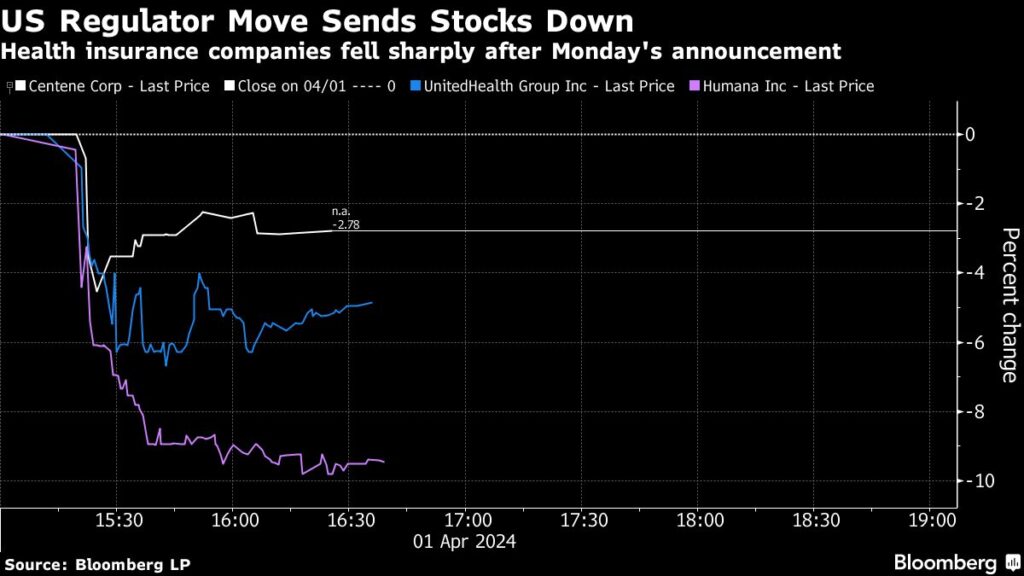(Bloomberg) – Health insurance stocks tumbled in late trading Monday after U.S. regulators failed to increase payments for private Medicare plans as the industry had hoped.
Most Read Articles on Bloomberg
President Joe Biden's administration's decision to stick with proposed Medicare Advantage rates in 2025 marks a break with recent practice and surprised Wall Street. Analysts at JPMorgan Securities found that only once in the past 10 years has the final interest rate not improved from the regulator's initial proposal. The tough stance on lobbying signals a new hurdle for insurers already facing higher-than-expected increases in health care costs.
Humana, which has the highest exposure to Medicare among major insurance companies, was down 9.4% in extended New York trading as of 5:48 p.m. UnitedHealth Group, the largest U.S. health insurance company, fell 4.6%, and CVS Health Corp. fell 5.2%. Elevance Health fell 4.1% and Centene fell 2.8%.
U.S. payments for Medicare Advantage plans will increase by an average of 3.7% in 2025, industry regulators announced Monday, the same increase proposed in January. This represents a decrease of 0.16%, excluding plans' estimates for patient illness, which can increase payments. Companies and analysts typically exclude it when analyzing rates.
Insurers make billions of dollars selling private versions of government coverage, which the Centers for Medicare and Medicaid Services' Monday announcement characterized as increased payments. Payments for Medicare Advantage plans will increase by $16 billion in 2025 from last year, and program costs will exceed $5 trillion, the agency said. CMS Administrator Chiquita Brooks LaSure said CMS' goal is to “maintain the stability of the Medicare Advantage program” and keep payments “up-to-date and accurate.”
Medicare Advantage has been a driver of growth and profitability in the health insurance industry for years. But the Biden administration has tightened some payment policies and moved to recover billions of dollars in past overpayments. Annual renewal of premium rates has always been a controversial policy, with insurance companies competing for better treatment and sometimes arguing that without it, seniors would suffer reduced benefits.
Investors will be watching this announcement to gauge the outlook for the industry. Bloomberg Intelligence analyst Duane Wright said in a Monday note that the lack of further hikes would “result in an increasingly challenging environment” for health insurers like Humana, UnitedHealth and CVS, adding that “the coming cycle… But interest rate pressures may continue.” He said insurers must submit 2025 proposed prices and other plan details to Medicare for approval by June, and could reduce benefits or raise premiums accordingly. He added that it is possible.
America's Health Insurance Plans, an industry group, said the policy “will put additional pressure” on plans as the U.S. changes other policies affecting Medicare Advantage. Some companies had already argued that the proposed rates were insufficient to cover rising health costs, which are clouding the outlook for the health sector. Investors are wary as medical costs exceed UnitedHealth and Humana's expectations.
Chief Financial Officer Susan Diamond said in a conference call in March that without further increases in payments, Humana will not be able to meet the high end of its goal of boosting earnings per share by $6 to $10 in 2025. Ta. The company had already lowered its outlook for this year.
The Medicare Advantage program paid out $455 billion to private health insurers last year, and the plan currently covers 31.6 million people, more than half of Medicare enrollees. But the plan has faced intense scrutiny over costs and patient access to treatment.
(Updated to include additional background and context)
Most Read Articles on Bloomberg Businessweek
©2024 Bloomberg LP


